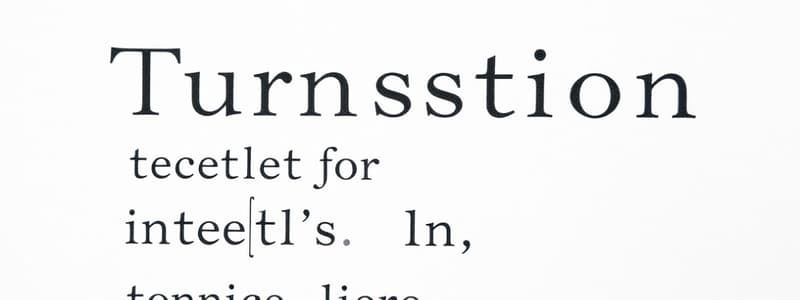Podcast
Questions and Answers
Which transition phrase indicates a situation that must be fulfilled?
Which transition phrase indicates a situation that must be fulfilled?
- In case
- Even if
- Assuming that
- Only if (correct)
What does the phrase 'In other words' signify?
What does the phrase 'In other words' signify?
- To indicate a contrasting idea
- To restate a complex idea simply (correct)
- To clarify a situation despite obstacles
- To introduce a hypothetical condition
Which of the following phrases serves as a clarification?
Which of the following phrases serves as a clarification?
- Even if
- Put differently
- To clarify (correct)
- Assuming that
What does 'Put differently' imply about a preceding statement?
What does 'Put differently' imply about a preceding statement?
Which phrase can be used to express a condition that occurs regardless of other circumstances?
Which phrase can be used to express a condition that occurs regardless of other circumstances?
Which word or phrase signifies an addition of information?
Which word or phrase signifies an addition of information?
What phrase is used to show a contrast or contradiction?
What phrase is used to show a contrast or contradiction?
Which term indicates a reason behind something?
Which term indicates a reason behind something?
Which phrase introduces a specific example?
Which phrase introduces a specific example?
Which phrase serves to summarize the core idea?
Which phrase serves to summarize the core idea?
Which term indicates simultaneous actions?
Which term indicates simultaneous actions?
Which phrase shows a result of something?
Which phrase shows a result of something?
What phrase emphasizes the most important point?
What phrase emphasizes the most important point?
Flashcards are hidden until you start studying
Study Notes
Addition
- "Too" adds information, similar to "also."
- "Moreover" supplements previously stated points, akin to "besides."
- "What’s more" introduces further information, paralleling "furthermore."
- "In fact" emphasizes or elaborates on information, equivalent to "indeed."
Contrast
- "Yet" indicates contrast or contradiction, similar to "but."
- "Rather" expresses preference or difference, denoting "instead."
- "On the contrary" presents opposing ideas, akin to "conversely."
- "Instead" replaces one idea with another, indicated as "in place of."
Cause and Effect
- "As" denotes reasoning, expressed as "because."
- "For this reason" defines a cause leading to an effect, resembling "therefore."
- "Hence" reveals outcomes, also meaning "therefore."
- "That’s why" clarifies the reason behind something, similar to "for that reason."
Comparison
- "In comparison" highlights similarities or differences, akin to "compared to."
- "In the same vein" parallels a similar approach, comparable to "similarly."
- "Comparable to" signifies similarity, synonymous with "similar to."
- "In alignment with" expresses agreement or similarity, equivalent to "in accordance with."
Examples
- "Including" lists specific examples within a group, similar to "such as."
- "For one thing" introduces an example, just like "for example."
- "Particularly" highlights a specific instance, akin to "especially."
- "As an illustration" presents an example, equivalent to "for instance."
Conclusion
- "In essence" condenses the main idea, much like "basically."
- "Overall" summarizes key points, comparable to "in general."
- "All in all" recaps the main ideas, similar to "on the whole."
- "As can be seen" wraps up by summarizing evidence, akin to "thus."
Time
- "In the meantime" refers to simultaneous occurrences, paralleling "meanwhile."
- "Meanwhile" indicates actions happening at the same time.
- "Subsequent to" suggests actions occurring afterward, also expressed as "following."
- "By the time" marks when certain events happen.
Emphasis
- "Truly" enhances emphasis, similarly to "indeed."
- "Undeniably" strongly asserts a point, comparable to "certainly."
- "In truth" underscores a reality, akin to "actually."
- "Above all" highlights the most critical point, representing "most importantly."
Condition
- "Only if" establishes necessary conditions, synonymous with "as long as."
- "Even if" suggests conditions occurring despite other factors.
- "In case" sets a conditional context, much like "if."
- "Assuming that" introduces hypothetical situations.
Clarification
- "In other words" rephrases a concept for simplicity, similar to "to put it another way."
- "That is to say" clarifies statements, akin to "in other words."
- "Put differently" offers alternative phrasing for clarity.
- "To clarify" aims to make a point more understandable.
Additional Insight
- Mastery of transition words can enhance writing clarity, especially in essays.
- These terms contribute to a strong vocabulary, aiding performance in assessments like the SAT.
Studying That Suits You
Use AI to generate personalized quizzes and flashcards to suit your learning preferences.




